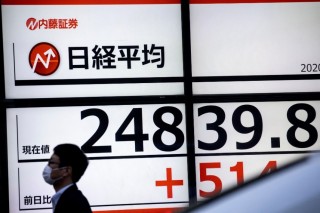Loading
Search
▼ Tokyo Stocks Open Lower On Concerns Japan-China Ties May Worsen
- Category:Other
Tokyo stocks opened lower Monday on concerns a joint Japan-US summit statement explicitly mentioning Taiwan may worsen ties between Tokyo and Beijing and affect Japanese firms with strong Chinese ties.
In the first 15 minutes of trading, the 225-issue Nikkei Stock Average shed 123.59 points, or 0.42 percent, from Friday to 29,559.78. The broader Topix index of all First Section issues on the Tokyo Stock Exchange was down 4.71 points, or 0.24 percent, at 1,956.16. Decliners were led by securities house, mining and air transportation issues.
At 9 a.m., the dollar fetched 108.73-74 yen compared with 108.74-84 yen in New York and 108.89-90 yen in Tokyo at 5 p.m. Friday. The euro was quoted at $1.1969-1969 and 130.12-19 yen against $1.1978-1988 and 130.31-41 yen in New York and $1.1987-1989 and 130.53-57 yen in Tokyo late Friday afternoon.
Meanwhile, Japan's exports in March grew 16.1 percent from a year earlier, the largest gain in over three years, as the pace of recovery from the initial impact of the coronavirus pandemic picked up on brisk material shipments to China, government data showed Monday.
Exports stood at 7.38 trillion yen ($68 billion), with its year-on-year expansion marking the biggest increase since a 16.2 percent jump in November 2017, the Finance Ministry said in a preliminary report.
They declined 4.5 percent in February. Rising from 6.36 trillion yen a year ago when the virus outbreak began to dampen global demand for cars and other Japan-made products, the latest monthly exports figure surpassed a pre-pandemic level of 7.20 trillion yen seen in March 2019 in terms of value.
By country, exports to China stood at 1.63 trillion yen to hit the highest-ever level since comparable data became available in January 1979, underpinned by strong demand for plastic and raw materials such as copper. Imports rose 5.7 percent to 6.71 trillion yen, up for the second straight month, which led the country to see a goods trade surplus of 663.72 billion yen, the second consecutive month of black ink.
As for fiscal 2020 through March, Japan's exports sank 8.4 percent from the previous year to 69.49 trillion yen due to repercussions from the pandemic, especially in the first six months.
They posted the sharpest decline since a 17.1 percent drop logged in fiscal 2009 in the wake of the global financial crisis. Imports in the previous business year sank 11.6 percent to 68.18 trillion yen, also the steepest fall in 11 years, mainly because of declining crude oil and other energy prices.
Both exports and imports shrank for the second successive year, which left Japan with a goods trade surplus of 1.31 trillion yen, the first black ink in three years. All figures were compiled on a customs-cleared basis.
In the first 15 minutes of trading, the 225-issue Nikkei Stock Average shed 123.59 points, or 0.42 percent, from Friday to 29,559.78. The broader Topix index of all First Section issues on the Tokyo Stock Exchange was down 4.71 points, or 0.24 percent, at 1,956.16. Decliners were led by securities house, mining and air transportation issues.
At 9 a.m., the dollar fetched 108.73-74 yen compared with 108.74-84 yen in New York and 108.89-90 yen in Tokyo at 5 p.m. Friday. The euro was quoted at $1.1969-1969 and 130.12-19 yen against $1.1978-1988 and 130.31-41 yen in New York and $1.1987-1989 and 130.53-57 yen in Tokyo late Friday afternoon.
Meanwhile, Japan's exports in March grew 16.1 percent from a year earlier, the largest gain in over three years, as the pace of recovery from the initial impact of the coronavirus pandemic picked up on brisk material shipments to China, government data showed Monday.
Exports stood at 7.38 trillion yen ($68 billion), with its year-on-year expansion marking the biggest increase since a 16.2 percent jump in November 2017, the Finance Ministry said in a preliminary report.
They declined 4.5 percent in February. Rising from 6.36 trillion yen a year ago when the virus outbreak began to dampen global demand for cars and other Japan-made products, the latest monthly exports figure surpassed a pre-pandemic level of 7.20 trillion yen seen in March 2019 in terms of value.
By country, exports to China stood at 1.63 trillion yen to hit the highest-ever level since comparable data became available in January 1979, underpinned by strong demand for plastic and raw materials such as copper. Imports rose 5.7 percent to 6.71 trillion yen, up for the second straight month, which led the country to see a goods trade surplus of 663.72 billion yen, the second consecutive month of black ink.
As for fiscal 2020 through March, Japan's exports sank 8.4 percent from the previous year to 69.49 trillion yen due to repercussions from the pandemic, especially in the first six months.
They posted the sharpest decline since a 17.1 percent drop logged in fiscal 2009 in the wake of the global financial crisis. Imports in the previous business year sank 11.6 percent to 68.18 trillion yen, also the steepest fall in 11 years, mainly because of declining crude oil and other energy prices.
Both exports and imports shrank for the second successive year, which left Japan with a goods trade surplus of 1.31 trillion yen, the first black ink in three years. All figures were compiled on a customs-cleared basis.
- April 19, 2021
- Comment (0)
- Trackback(0)


